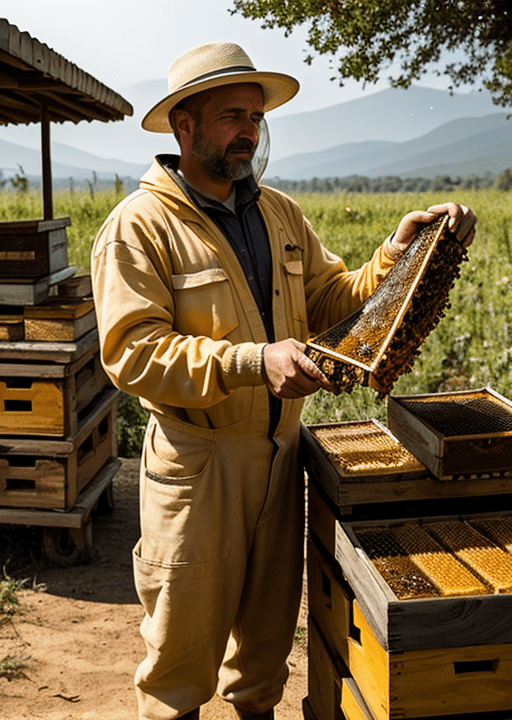Should You Sell Your Honey on Consignment?

You’ve put in the hard work of managing your beehives, harvesting honey, and packaging it with care. Now, the next step is to consider how to sell your honey. While there are various options available, one possibility to consider is selling your honey on consignment.
This article will explore the advantages and disadvantages of consignment selling, as well as essential considerations for beekeepers to bear in mind when making this decision.
Understanding Consignment Selling of Honey
Consignment selling refers to a business arrangement where beekeepers or honey producers provide their products to a retailer, wholesaler, or another intermediary who agrees to display and sell the honey on their behalf.
Instead of purchasing the honey upfront, the retailer only pays the producer for the sold items, typically retaining a percentage of the sale as their commission. The unsold honey is returned to the producer.
Pros of Selling Your Honey on Consignment
Here, we will explore the advantages that consignment sales bring to beekeepers, providing valuable insights on how this selling approach can boost your honey business.
- Increased Exposure for Your Product: Consignment selling offers an excellent opportunity for beekeepers to showcase their honey to a wider audience. By partnering with retail stores, farmers’ markets, or specialty boutiques, you can benefit from increased visibility. Placing your honey jars on shelves alongside other complementary products allows potential customers to discover your brand and learn about the unique qualities of your honey. This exposure can lead to a higher likelihood of sales and establish a loyal consumer base.
- Opportunity to Reach New Customers: Entering into a consignment agreement allows you to tap into new customer bases that may previously have been untouched. By placing your honey in stores or locations that cater to health-conscious individuals, food enthusiasts, or those seeking sustainable and natural products, you can connect with customers who are specifically looking for what you have to offer. This enhanced exposure is a valuable opportunity for growth and expanding your customer demographic.
- Potential for Higher Sales Volume: Consignment selling could potentially result in higher sales volumes for your honey. By reaching a broader market, having your products readily available at various locations, and leveraging the existing customer base of retailers, you increase the probability of selling more jars of honey. Consignment agreements often allow for a larger stock to be displayed compared to traditional wholesale purchasing, showcasing the variety of honey products you offer and enticing customers to make multiple purchases.
- Ability to Test Market Demand: Before investing significant resources into mass production or launching new honey flavors, consignment sales provide beekeepers with the opportunity to test market demand. By observing how well your honey sells in different stores or locations, you can gather valuable data on which products resonate best with consumers. This information allows you to make informed decisions when expanding your product line, targeting specific markets, or undertaking future marketing campaigns.
- Building Relationships with Retailers: Consignment selling nurtures mutually beneficial relationships with retailers. As you collaborate with various businesses to display and sell your honey, you gain the opportunity to establish personal connections with store owners, managers, and staff. These relationships can be invaluable in the long run, as they may open doors to further partnerships and negotiations. Building trust and rapport with retailers can also lead to prominent product placement, recommendations, or even exclusivity agreements in the future.
Cons of Selling Your Honey on Consignment

Now, it’s time to talk about the cons of selling your honey on consignment, providing you with valuable insights to make an informed decision for your beekeeping venture.
- Risk of non-payment: When you sell your honey on consignment, you entrust your products to retailers or businesses without receiving immediate payment. This poses a significant risk as there is no guarantee that you will be paid for your hard work. Unfortunately, some retailers may experience financial difficulties or choose not to honor their obligations, leaving you with the burden of chasing payments. This uncertainty can create financial strain and discourage beekeepers from opting for consignment.
- Lack of control over pricing: When you consign your honey to retailers, you relinquish control over the pricing decisions. Retailers may choose to sell your honey at a higher or lower price than you intended, which can impact your profit margins and branding strategy. Additionally, lack of control over pricing may lead to inconsistencies in market value, potentially causing confusion among customers and affecting your overall sales.
- Potential for damaged or unsold products: Consignment agreements involve the transfer of your honey to retailers’ shelves, making your products susceptible to damage, mishandling, or expiration. While most retailers take proper care of consigned goods, accidents can occur. The risk of unsold products is another concern as retailers may not actively promote your honey or prioritize its sale, leading to stock that goes stale on their shelves. This can result in financial losses and wastage of your hard-earned honey.
- Time and effort required for managing consignment agreements: Consignment requires a significant investment of time and effort to manage the necessary agreements and paperwork. From negotiating terms and conditions to tracking inventory and sales, handling consignment arrangements can be cumbersome. As a beekeeper, your time is better spent tending to your bees and focusing on core aspects of your honey production. Engaging in consignment may divert your attention from your primary beekeeping activities.
- Differences in marketing strategies and branding: Selling honey on consignment means collaborating with various retailers who might have different marketing strategies and branding than your own. This can create a mismatch in how your honey is presented to customers, potentially diluting the image you want to convey. Inconsistencies in branding can confuse customers and make it harder to establish a strong, unified presence in the market.
Essential Considerations for Beekeepers
Here are some of the essential considerations for beekeepers to help you optimize your operations and foster fruitful partnerships with consignment partners. By evaluating potential partners, developing clear agreements, setting reasonable pricing and payment terms, maintaining open communication, and monitoring sales, you can enhance your beekeeping business and achieve long-term success.
– Evaluating Potential Consignment Partners
Before entering into consignment partnerships, it is crucial to assess potential partners to ensure compatibility and reliability. Consider the following factors during your evaluation:
- Trustworthiness and reputation: Research the reputation and credibility of potential consignment partners. Seek feedback from other beekeepers or industry experts to gauge their trustworthiness and determine if they align with your values.
- Target market alignment: Evaluate whether the consignment partner reaches your desired target market. Analyze their customer base to determine if they have a similar clientele who would be interested in your beekeeping products.å
- Track record of sales success: Investigate the history of previous consignments made by the potential partner. Look for evidence of successful sales and consistent performance to ensure that your products will be given proper attention and care.
– Developing a Clear Consignment Agreement
A well-defined consignment agreement is fundamental for establishing a solid foundation in any partnership. Pay attention to the following aspects while drafting the agreement:
- Responsibilities and obligations: Clearly outline the rights and responsibilities of both parties involved. Specify aspects such as product delivery, display arrangements, sales tracking, and payment terms to avoid any potential misunderstandings.
- Pricing and commission structure: Detail the pricing of your beekeeping products and the commission percentage that the consignment partner will earn from their sale. Be sure to factor in production costs, market value, and fair compensation for both parties.
- Duration and termination: Establish the duration of the consignment period, specifying start and end dates. Additionally, include conditions for termination, such as notice periods or circumstances that could lead to termination.
– Determining Pricing and Payment Terms

Setting appropriate pricing and payment terms is crucial to ensuring a fair and profitable partnership. Consider the following points when determining these aspects:
- Market research: Conduct thorough market research to understand pricing trends and the value of similar beekeeping products. This will help you set competitive prices that reflect the quality and uniqueness of your offerings.
- Consistent price monitoring: Regularly evaluate market fluctuations and adjust your pricing strategy accordingly. Keep an eye on supply and demand dynamics and adapt to maintain a competitive edge and maximize profits.
- Secure payment terms: Establish clear payment terms, including modes of payment and frequency, to avoid any delays or disputes. Consider accepting various payment options to accommodate customer preferences.
– Communicating with Consignment Partners
Open and effective communication is vital to the success of any partnership. Follow these guidelines for maintaining fruitful communication with your consignment partners:
- Regular updates: Provide your consignment partners with regular updates on product availability, new additions to your inventory, or any other relevant information. Keeping them in the loop ensures a proactive and collaborative approach.
- Responsiveness: Respond promptly to any queries or concerns raised by your consignment partners. Addressing their needs in a timely manner builds trust and strengthens the relationship.
- Feedback exchange: Encourage a feedback culture with your consignment partners. Solicit their opinions on product performance, customer response, or any suggestions for improvement. Similarly, provide constructive feedback about their sales techniques or areas where adjustments may be needed.
– Monitoring and Evaluating Consignment Sales
To ensure the effectiveness of your consignments, continuous monitoring and evaluation are essential. Consider the following measures:
- Tracking sales performance: Implement a robust system to track sales made through your consignment partners. Monitor which products are selling well and which ones need adjustments or additional marketing efforts.
- Sales analysis: Analyze sales data to identify patterns, trends, and potential opportunities. This analysis will help you make informed decisions about pricing strategies, product development, and expansion plans.
- Partner evaluation: Regularly evaluate the performance of your consignment partners. Assess their adherence to the consignment agreement, sales volume, customer feedback, and overall satisfaction. This evaluation will help you maintain an effective and mutually beneficial network of consignment partners.
Wholesale vs Consignment Selling
When selling honey, beekeepers have the option to choose between wholesale and consignment sales, each with its unique advantages and considerations.
Wholesale offers the potential for higher volumes, immediate payments, and scalability, while consignment provides increased exposure, reduced initial investment, and partnership opportunities. Determining the most suitable sales method ultimately depends on a beekeeper’s production capacity, financial goals, and market analysis. By carefully weighing both options, honey producers can make informed decisions to optimize their sales strategies and thrive in the honey industry.
Conclusion
Consignment selling can be a promising avenue for beekeepers to expand their market reach, increase sales, and cultivate valuable partnerships with retailers and vendors.
However, it also poses unique challenges and risks that beekeepers must carefully assess and address to ensure success. By employing best practices, learning from experienced beekeepers, and navigating the complexities of consignment selling, beekeepers can harness the potential of this business model to grow their honey business and achieve sustainable success.
FAQ:
What does it mean to sell honey on consignment?
- Selling honey on consignment refers to an arrangement where a beekeeper provides their honey to a retailer or business for sale without immediate payment. The beekeeper retains ownership of the honey until it is sold, and they receive payment or a percentage of the sale price.
How does selling honey on consignment benefit beekeepers?
- Selling honey on consignment can provide beekeepers with an additional sales channel, allowing them to reach a broader customer base. It also offers the opportunity to showcase their honey in retail locations where potential buyers may discover their products.
Are there any risks associated with selling honey on consignment?

- While consignment sales can be advantageous, there are some risks involved. One potential risk is the possibility of not receiving payment if the retailer fails to sell the honey or closes down. Additionally, there may be challenges in ensuring the quality and storage conditions of the honey during the consignment period.
How can beekeepers protect themselves when selling honey on consignment?
- To mitigate risks, beekeepers should establish a clear consignment agreement with the retailer. This agreement should include terms regarding payment, duration of the consignment period, responsibilities for product storage and handling, and a provision for the return of unsold honey.
What factors should beekeepers consider before opting for consignment sales over wholesale selling?
- Before opting for consignment sales, beekeepers should consider factors such as the demand and popularity of their honey product, the reputation and reliability of the retailer or vendor with whom they will be consigning, and the terms and conditions of the consignment agreement, including the commission they will receive.
Are there any advantages to choosing consignment sales over wholesale selling?
- Yes, consignment sales offer advantages such as increased exposure for the beekeeper’s honey product, the opportunity to leverage the retailer’s customer base, and the potential for higher profit margins compared to wholesale selling.
How should beekeepers determine the consignment pricing for their honey?
- When setting consignment pricing, beekeepers should consider their production costs, packaging expenses, and the retailer’s commission or percentage of the sale price. It’s crucial to strike a balance that ensures fair compensation while remaining competitive in the market.
Are there alternatives to consignment sales for beekeepers?
- Yes, there are alternative sales methods for beekeepers, such as direct sales through farmers’ markets, online platforms, or establishing wholesale relationships with retailers. Each method has its own set of advantages and considerations, so beekeepers should explore multiple options to find the most suitable approach for their business.
Can consignment sales be a profitable avenue for beekeepers in the long run?
- Consignment sales can be profitable for beekeepers, but it depends on various factors, including the demand for locally produced honey in the retailer’s target market, the effectiveness of marketing efforts, and the quality and price competitiveness of the honey. Consistent evaluation and adjustment of the consignment strategy play a vital role in long-term profitability.
Should beekeepers sell all their honey on consignment or diversify their sales approach?
- Diversification is often recommended for beekeepers to minimize risks and explore various sales avenues. Beekeepers can choose to allocate a portion of their honey for consignment sales while simultaneously engaging in direct sales, wholesale distribution, or other marketing techniques to maximize their exposure and revenue potential.




